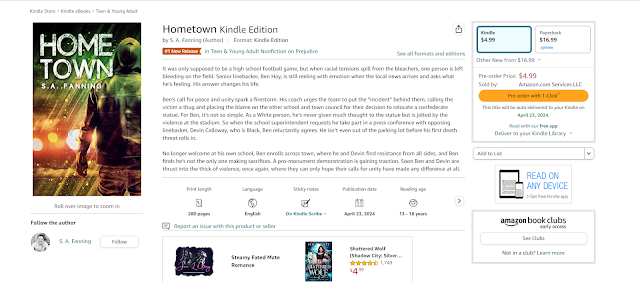My Q&A with Bookview
Recently, we interviewed S. A. Fanning, the author of Please Don’t, (Read the review here.) Fanning’s debut, Justice in a Bottle is being considered by the New York Public Library for their “Best of 2020” list and was a finalist for the 2020 Indies Today Awards.
Do you find writing therapeutic?
Absolutely. There’s no other reason to write so furiously. When I get a story going, I mean, really going, it’s the best feeling in the world. I’ll go for a walk, rehashing things, plotting it out, then get back to the page. Things change, fall into place, take shape and once you realize it’s all coming together, it’s like magic.
How often you read?
Every day. Working from home, I have this schedule. At lunch, I take the dogs for a quick walk, then grab whatever novel I’m reading and climb up to the treehouse in the front yard to read for half an hour. The other day I was so engulfed in a book that a bird landed on my leg and it took me a bit to notice. In the afternoon I take fifteen minutes and shoot free throws on the basketball goal at the end of the street. All three of these activities are equally important to my writing.
I also get some reading time in at night with my eight-year-old son. Nothing quite like lying side by side, both of us with our books, reading until we’re too tired to go on.
Does your family support your career as a writer?
My stepmother is the author of twenty-seven traditionally published true crime books and novels. She’s guided me along since the beginning, almost ten years ago when I started getting serious. My grandmother has published books as well, along with several pieces that have appeared in Guidepost and Better Living. She’s always been my favorite beta reader. So, yeah, I’m supported!
What was an early experience where you learned that language had power?
Back to my stepmom. When I was maybe nine, my dad and I took a blow-up raft on a trip down the creek at the nearby park. Seeing a small dam ahead, maybe a couple of feet, I bailed, while my fearless dad plunged ahead and took the raft over the dam, gouging a hole in its side, sinking him to the bottom of the creek. We dragged it out of the creek and took it home where we tried to patch it up.
My stepmother grabbed her pen and went to work, writing to the company and explaining the devastation of a young boy, who went on a, um, “rafting trip” with his father, when the raft popped and left him beached at the park.
A few weeks later, a new raft arrived in the mail.
What’s more important: characters or plot?
Character for sure.
How do you begin a book?
With words, totally winging it. No, I usually have some sort of idea, or character who comes to mind. But I am a pantser, so most of the time the first draft is just me getting to know the characters.
Do you think someone could be a writer if they don’t feel emotions strongly?
This is a great question, one I’ve thought about many times. I suppose yes, you can write without experiencing strong emotions. But as a writer of children’s books, teen books, I often draw on a point in my childhood—good or bad—that was so strong it left an impact.
Whether it be at home, school, or even a bad breakup, those down moments, the pain that accompanies it, can lead to some of the best moments on the page.
***
Pete has written more than one manuscript and used them to start more than one fire. But his debut, Justice in a Bottle is being considered by the New York Public Library for their “Best of 2020” list and was a finalist for the 2020 Indies Today Awards. And stay tuned, Pete has four books being published in 2021, starting with Bricktown Boys in January.
Pete can be found at http://www.petefanning.com
Source


Comments
Post a Comment